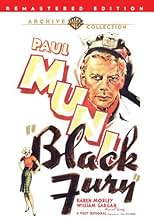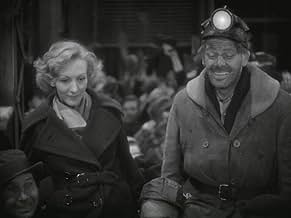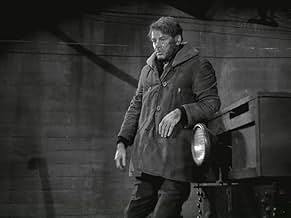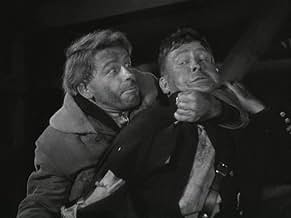NOTE IMDb
6,4/10
1,1 k
MA NOTE
Un mineur est impliqué bien malgré lui dans un conflit entre les employés et les patrons d'une mine.Un mineur est impliqué bien malgré lui dans un conflit entre les employés et les patrons d'une mine.Un mineur est impliqué bien malgré lui dans un conflit entre les employés et les patrons d'une mine.
- Réalisation
- Scénario
- Casting principal
- Nommé pour 1 Oscar
- 2 victoires et 2 nominations au total
John Qualen
- Mike
- (as John T. Qualen)
J. Carrol Naish
- Steve
- (as J. Carroll Naish)
Joseph Crehan
- Farrell
- (as Joe Crehan)
Sara Haden
- Sophie Shemanski
- (as Sarah Haden)
G. Pat Collins
- Lefty - Company Policeman
- (as George Pat Collins)
Avis à la une
Joe Radek (Paul Muni) is a simple-minded, hardworking immigrant coal miner who dreams of buying a farm and settling down with his girl, Anna (Karen Morley). But when Anna leaves him for another man, Joe falls apart and takes to drinking. In Joe's current state of mind, he's manipulated by a union buster (J. Carrol Naish) into revolting against the mining company. This has disastrous results for the laborers but Joe determines to set things right by any means necessary.
Paul Muni's only film with director Michael Curtiz. As was often the case with Muni, his performance can be seen either as brilliant or 100% ham. Whichever it is, I enjoyed it a lot. The cast is full of reliable Warner Bros contract players that are always fun to watch, especially great character actor J. Carrol Naish. It's not surprising this is from WB, the 1930s home of movies about the working class. Certainly interesting from a historical and sociological perspective as a view of labor issues in Depression-era America. It's also fine dramatic entertainment. Based in part on a true story of a 1929 incident at a mine in Imperial Pennsylvania.
Paul Muni's only film with director Michael Curtiz. As was often the case with Muni, his performance can be seen either as brilliant or 100% ham. Whichever it is, I enjoyed it a lot. The cast is full of reliable Warner Bros contract players that are always fun to watch, especially great character actor J. Carrol Naish. It's not surprising this is from WB, the 1930s home of movies about the working class. Certainly interesting from a historical and sociological perspective as a view of labor issues in Depression-era America. It's also fine dramatic entertainment. Based in part on a true story of a 1929 incident at a mine in Imperial Pennsylvania.
"Black Fury" was the only time Paul Muni worked with Michael Curtiz. Potentially, this film could have been great but it is far from that. Muni wasn't very keen on acting in films, his preference was always going to be the theatre. He wasn't able to tone down his acting style for the cinema for the most part and he often appeared to be playing a caricature. He is guilty of this in the film "Black Fury." He is too theatrical in his facial expressions, his body language etc. Paul Muni plays a simple but honest coal miner who unwittingly becomes involved in a bitter dispute between the workers and the management. Muni, along with other miners, is subjected to intimidation. Barton MacLane is cast as a villain (he usually was) who is sent to destroy the livelihood of all the coal miners in this small community. Technically, the film is a disappointment. It is all too obvious that the sets representing the town in question are all on a soundstage. The sets don't look real and the direction from Michael Curtiz tends to suffer. The story itself is actually quite good and the film maintains a steady pace. The climax is also effective.
Never realized that Paul Muni, (Joe Radek) played in a film concerning miners in Pennsylvania and gave such an outstanding performance beyond anything I realized he had accomplished in his long career on the silver screen. In this film Joe Radek is an immigrant to this country, however, he is very clever in many ways and seeks justice for his fellow workers in the coal mine in which the town people work. Karen Morley,(Anna Novak) gives a great supporting role to this film and really loves Joe Radek and what he is trying to accomplish. The town is controlled by the coal mine owners and Barton MacLane,( McGree )along with William Gargan,(Slim Johnson/Company Police bully the people in the town along with J Carrol Nash,(Steve Croner) who all work against the miners and control their living conditions. There is a big problem trying to establish a Labor Union and there is a constant battle between the very poor and rich people of the community. Paul Muni gave the best performance I have ever seen in this Classic 1935 film, don't miss this picture.
In 'Black Fury', Paul Muni gives one of his best performances, and also appears on screen in one of his more plausible make-ups. This time he plays a Slavic immigrant, uneducated but keenly intelligent, working in an American coal mine. Muni's hair is dyed blond, yet looks realistic, and his own Eastern European facial features work with this characterisation ... not against it, as they did for some of his other roles. The film also features a fine performance from John Qualen, a prolific character actor whose film appearances were often marred by unconvincing and unnecessary foreign accents of the "yumpin' yiminy!" sort. In 'Black Fury', Qualen's flavour-of-the-month accent is less obtrusive than usual, and it actually works for the character he plays: a Polish-American miner.
Joe Radek (Muni) is a miner in a 'company town', where all the labourers are poorly-paid and live in squalid shanties. Radek and his fellow miners work in extremely dangerous conditions. The company that owns the mine also owns all the local businesses, and the local police force also work for the mining company. The cops have no interest in justice: they're bullies whose only concern is to keep the locals quiet and subservient to the company. The head cop is a slimy sadist named McGee, well-played by Barton MacLane. Radek's buddy Shemanski (Qualen) gets drunk one night and makes the mistake of criticising company policy: staggering home that night, he has a fatal 'accident' arranged by McGee's goons.
To call attention to various grievances, Radek fills the mineshaft with dynamite. He packs several days' worth of food for himself, then he takes McGee hostage at gunpoint and brings him into the mine. Radek chains McGee to the pit face, slightly out of reach of Radek's food supply. If Radek's demands aren't met, he's going to blow up the mine ... with himself and McGee inside. After they've been in the mine for several days, there's one harrowing shot of the starving McGee chained to the wall, begging Radek for food. The film ends with one of those slam-bang action climaxes that Warner Bros did so well, spiced with some social commentary that doesn't get too preachy.
The film boasts an excellent supporting cast, filled with actors who are (mostly) more obscure than usual, which helps us to immerse ourselves in the action. Karen Morley, quietly beautiful, gives a fine performance, and Michael Curtiz (a very underrated director) does his usual superlative work.
'Black Fury' is based on a story by Michael A. Musmanno, a Pennsylvania lawyer of Italian descent. Late in his life, Musmanno devoted several decades to writing a book called 'Columbus *WAS* First' (his emphasis), which purported to prove that no European explorers reached the Americas before Columbus. Musmanno's claims for Columbus have long since been disproven, but 'Black Fury' is an excellent film. I'll rate this movie 9 points out of 10.
Trivia note: Shortly after this movie was released, Warner Brothers released a Loony Toon starring Porky Pig as a hunter who had a dog named Black Fury. What a shameless plug!
Joe Radek (Muni) is a miner in a 'company town', where all the labourers are poorly-paid and live in squalid shanties. Radek and his fellow miners work in extremely dangerous conditions. The company that owns the mine also owns all the local businesses, and the local police force also work for the mining company. The cops have no interest in justice: they're bullies whose only concern is to keep the locals quiet and subservient to the company. The head cop is a slimy sadist named McGee, well-played by Barton MacLane. Radek's buddy Shemanski (Qualen) gets drunk one night and makes the mistake of criticising company policy: staggering home that night, he has a fatal 'accident' arranged by McGee's goons.
To call attention to various grievances, Radek fills the mineshaft with dynamite. He packs several days' worth of food for himself, then he takes McGee hostage at gunpoint and brings him into the mine. Radek chains McGee to the pit face, slightly out of reach of Radek's food supply. If Radek's demands aren't met, he's going to blow up the mine ... with himself and McGee inside. After they've been in the mine for several days, there's one harrowing shot of the starving McGee chained to the wall, begging Radek for food. The film ends with one of those slam-bang action climaxes that Warner Bros did so well, spiced with some social commentary that doesn't get too preachy.
The film boasts an excellent supporting cast, filled with actors who are (mostly) more obscure than usual, which helps us to immerse ourselves in the action. Karen Morley, quietly beautiful, gives a fine performance, and Michael Curtiz (a very underrated director) does his usual superlative work.
'Black Fury' is based on a story by Michael A. Musmanno, a Pennsylvania lawyer of Italian descent. Late in his life, Musmanno devoted several decades to writing a book called 'Columbus *WAS* First' (his emphasis), which purported to prove that no European explorers reached the Americas before Columbus. Musmanno's claims for Columbus have long since been disproven, but 'Black Fury' is an excellent film. I'll rate this movie 9 points out of 10.
Trivia note: Shortly after this movie was released, Warner Brothers released a Loony Toon starring Porky Pig as a hunter who had a dog named Black Fury. What a shameless plug!
10kcfl-1
Let's look at 1935: I don't think there's anyone reviewing now who went to the movies that year, so we have to rely on video. I've seen about 100 films from that year; many have not been preserved. "The Informer"won the Oscar, and a worthy film it was. "A Night at the Opera," "ChinaSeas," "The Good Fairy" "Lives of a Bengal lancer," "Naughty Marietta,"and "The Devil Is a Woman" also came out that year, all great films. "Black Fury" was better than any of them. It's gripping from the first frame to the last. It's as realistically set, and politically sensitive, as any Hollywood film. The closest political thriller I've seen to it is "Massacre" (1934). I loved it for the big factors, like digging itself into an impossible hole, then managing to escape, and Muni's performance. Also for the small ones, like all the supporting performances and the fact that the union happens to be integrated.
Le saviez-vous
- AnecdotesThough it received no official Oscar nominations, the Academy permitted write-in candidates this year and when the voting order was announced it turned out that Paul Muni had come in second in the balloting, narrowly behind winner Victor McLaglen but ahead of any of the other nominated actors.
- GaffesAt c. 24 minutes Joe is counting out his money, but he is inconceivably inaccurate. After counting to 68 dollars he places two further bills on the table and counts "73" out loud. A few moments later he counts up to 75 dollars, but, after four more bills have been placed in front of him he announces "76" dollars as his total.
- ConnexionsFeatured in Hollywood and the Stars: The Angry Screen (1964)
- Bandes originalesWhy Do I Dream Those Dreams?
(1934) (uncredited)
Music by Harry Warren
Played on piano in bar during scene where men challenge Radek
Meilleurs choix
Connectez-vous pour évaluer et suivre la liste de favoris afin de recevoir des recommandations personnalisées
Détails
- Durée1 heure 34 minutes
- Couleur
- Mixage
- Rapport de forme
- 1.37 : 1
Contribuer à cette page
Suggérer une modification ou ajouter du contenu manquant






































